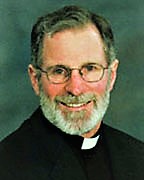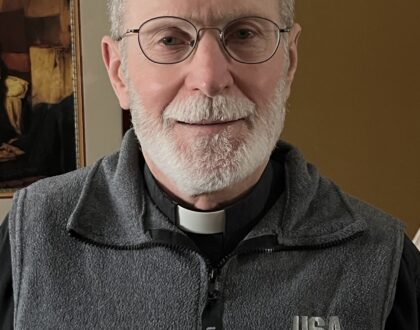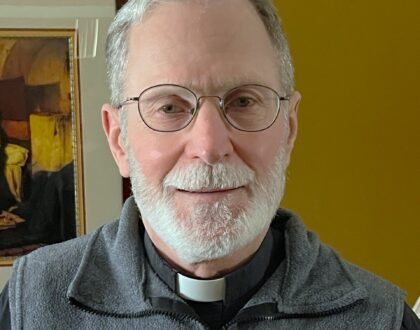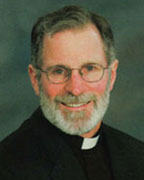Homily, January, 19, 2025

From The Pastor
Imagine Jesus at the wedding in Cana of Galilee. What is he thinking? How does he feel about being there? He is in the early months after his Baptism by John the Baptist. We must assume that this experience is still very much in his mind. At thirty or so years of age, Jesus has a highly developed spiritual sense of himself as well as deep personal awareness of the Father’s love for him. I assume the words of the Father’s voice heard at his Baptism, “This is my Beloved Son with whom I am well pleased” is at the center of his awareness and the focal point of his personal prayer.
After his Baptism, Jesus is led into the desert for forty days to fast and pray about the confirmation of his identity with the Father and what it means for his life. He is fully aware of the communion of love he shares with the Father. This oneness with the Father elicits the temptations of the Devil who seeks to destroy the role and mission of his life. Jesus will not deny the truth of the Father’s love and readily rejects the temptations of the Devil.
Leaving the desert, secure in the call of his mission, Jesus begins his public ministry. In short order, He is invited to a wedding in Cana in Galilee. Jesus is outgoing, loves to be with people, and is always ready to engage in human encounters. All this while he is in the frame of his mission and ultimate call to the Cross. Moving in the Divine will, Jesus fully engages his human life.
Interjected into this very human scene, St. John the gospel writer uses the event to convey the symbolism of a wedding, a shortage of wine, and a miracle of changing water into wine to indicate the work of Jesus that will lead to the Cross. Beyond the wedding of a young couple, John is conveying to us in the person of Jesus the marriage of God and humanity, the union of heaven and earth. Jesus is the Bridegroom; we are the Bride. God seeks a union of love with all he has created.
It would have been a great humiliation for the family if the wine had run out. Mary informs Jesus of the concern. He initially deflects. As only a mother can, Mary tells the servants to do as he tells them. Jesus obeys his mother despite ‘my hour has not yet come.’ In love, Jesus not only obeys his mother, but most fully the will of his Father.
The multiplication of the wine is twofold. On the one hand, the power of Jesus is revealed in the miraculous abundance of wine. Secondly, the abundance of wine symbolizes the abundant love Jesus offers on the Cross by the shedding of his Blood. Our union with God is realized through the Blood of Christ.
Why the symbolism? God in the person of Christ is being introduced to the world. The presence of Jesus creates a new frame of understanding of who God is and what God intends for all humanity, and each of us personally. The presence and reality of Jesus is too stark, too radical to accept without faith in the mystery and power of God to heal, reconcile, and redeem. The stark reality of God in the flesh is too much. Symbolism opens our awareness to a mystery beyond the ability of words to convey.
God is a mystery come in the flesh. No one gets that without the action of the Holy Spirit. Jesus is filled with the Spirit, his life animated by the power of the Spirit, the power of Love given at the time of his Baptism. Notice that these early movements make clear both the human nature of Jesus in union with his Divine nature. This is where we come in.
This is where we see the unity and strength of the Sacraments of Initiation. In Baptism we are consecrated to Christ through a profession of faith (at infancy by our parents) and we receive the Holy Spirit. Christ lives in us in the person of the Holy Spirit. We begin a journey of faith, hope, and love that matures us in the ways of God seen in the Lord Jesus. Like Jesus, we learn to obey our hearts in the virtues of love, goodness, and gospel values.
In preparation for First Communion, we learned about sin and its effects. We are offered the Sacrament of Reconciliation. In any disobedience against love, we receive the Lord’s mercy and forgiveness, readily given to restore our peace with God, self, and others.
Accepting the gift of our redemption (forgiveness of sin) through the Blood of the Lord Jesus, we are called to the table of the Eucharist to be nourished. Bread and wine are consecrated into to the Body and Blood of the Lord Jesus, consumed by us to express our communion with God who is in communion with us through the dying and rising of the Lord Jesus.
Symbols are essential to convey spiritual and Divine things. The Eucharist is not a symbol. It is the living reality of the Lord Jesus given to us in Sacramental signs to strengthen the marriage we share with God in Christ. Please ponder how these mysteries of love are evident and active in your life.
Father John Esper
Recent Sermons

Homily, April 6, 2025
April 05, 2025

Homily, March 30, 2025
March 27, 2025

Homily, March 23, 2025
March 20, 2025

